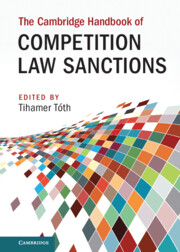Book contents
- The Cambridge Handbook of Competition Law Sanctions
- The Cambridge Handbook of Competition Law Sanctions
- Copyright page
- Contents
- Authors’ Affiliations
- Acknowledgment
- Part I General Chapters
- Part II Country Reports
- 17 Competition Law Sanctions in Austria
- 18 Antitrust Enforcement in Belgium
- 19 The Effectiveness of Competition Law Sanctions: Brazil
- 20 The Present Situation and Improvement Direction of the Sanction System in China’s Anti-monopoly Law
- 21 Application of the 2006 Guidelines on Fines by the European Commission and the Union Courts
- 22 Competition Law Sanctions in Germany
- 23 Competition Law Sanctions in Hungary
- 24 Competition Law Sanctions in Indonesia and a Comparison to Other ASEAN Member States
- 25 Competition Law Sanctions in Italy
- 26 Competition Law Sanctions in Japan
- 27 Effectiveness of Competition Law Sanctions: Kenya
- 28 The Enforcement of Competition Law in the Netherlands
- 29 A Barking Dog Seldom Bites
- 30 Effectiveness of Competition Law Sanctions
- 31 Competition Law Sanctions in Spain
- 32 The Swedish Competition Law Enforcement System
- 33 Effectiveness of Competition Law Sanctions: Turkey
- 34 Competition Law Sanctions in the United Kingdom
22 - Competition Law Sanctions in Germany
from Part II - Country Reports
Published online by Cambridge University Press: 29 July 2022
- The Cambridge Handbook of Competition Law Sanctions
- The Cambridge Handbook of Competition Law Sanctions
- Copyright page
- Contents
- Authors’ Affiliations
- Acknowledgment
- Part I General Chapters
- Part II Country Reports
- 17 Competition Law Sanctions in Austria
- 18 Antitrust Enforcement in Belgium
- 19 The Effectiveness of Competition Law Sanctions: Brazil
- 20 The Present Situation and Improvement Direction of the Sanction System in China’s Anti-monopoly Law
- 21 Application of the 2006 Guidelines on Fines by the European Commission and the Union Courts
- 22 Competition Law Sanctions in Germany
- 23 Competition Law Sanctions in Hungary
- 24 Competition Law Sanctions in Indonesia and a Comparison to Other ASEAN Member States
- 25 Competition Law Sanctions in Italy
- 26 Competition Law Sanctions in Japan
- 27 Effectiveness of Competition Law Sanctions: Kenya
- 28 The Enforcement of Competition Law in the Netherlands
- 29 A Barking Dog Seldom Bites
- 30 Effectiveness of Competition Law Sanctions
- 31 Competition Law Sanctions in Spain
- 32 The Swedish Competition Law Enforcement System
- 33 Effectiveness of Competition Law Sanctions: Turkey
- 34 Competition Law Sanctions in the United Kingdom
Summary
The chapter describes how the mix of competition law sanctions and enforcement instruments in Germany has been significantly expanded in recent years. A special feature of the German competition law procedure is that there are two different types of proceedings. Administrative proceedings allow for less serious consequences, such as prohibitions, behavioural and structural remedies, and disgorgements. More severe measures, such as regulatory fines, can only be adopted in regulatory offence proceedings. Criminal law does not play a major role in the enforcement of competition law in Germany. There is only one real criminal offence, bid-rigging. Recent reforms have concerned the liability of parent companies and legal and economic successors, the codification of the leniency programme and the calculation of fines. A highly controversial issue is the liability of managers and employees. New enforcement approaches currently being discussed or already being tested include exclusion from public tenders, reputational sanctions, whistle-blowing and increased use of negotiated settlements. Private enforcement seems to be making particularly great progress as a result of the EU Antitrust Damages Directive. Overall, the current system in Germany seeks to combine incentives for voluntary compliance with tough sanctions and strict enforcement for those who nevertheless break the law.
Keywords
- Type
- Chapter
- Information
- The Cambridge Handbook of Competition Law Sanctions , pp. 381 - 406Publisher: Cambridge University PressPrint publication year: 2022
- 1
- Cited by



